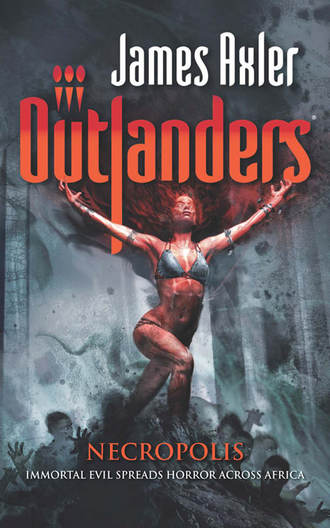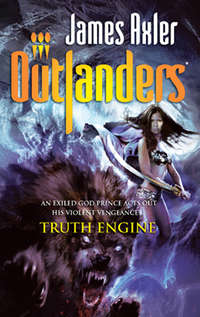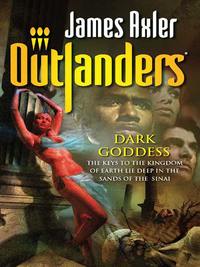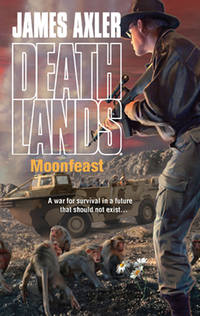
Полная версия
Necropolis
Thurpa smiled weakly. “It doesn’t feel like far enough.”
“We’re honored to have you with us,” Brigid said. She offered her hand.
The young Nagah accepted the hand. His palm and finger plates were smooth, supple and slightly warm, a sign of his mammalian metabolism. He still seemed uncomfortable around people, and Brigid could empathize. Her intellect had isolated her when dealing with others in years gone by. Only since she’d thrown herself into the world as one of the exiles from Cobaltville, adventuring around the world, had she lost her self-consciousness. Even so, there were times when she felt like an alien in the room; others did not possess her perfect recall.
Extrapolating that outsider’s discomfort with an inhuman exterior appearance must have been a crushing bit of alienation.
What made it all the more painful was Thurpa had aligned himself with Durga, a traitor and murderer, responsible for the deaths of many of his people and intense suffering. Returning home would be just as alienating. People would remember.
And they would shun him at the very least. At worst, his life would be in constant peril.
Maybe the Cerberus redoubt would be a good place for Thurpa, and, ultimately, Brigid would invite him to become a part of their ragtag family of misfits, exiles and refugees. But for now they needed him and his knowledge here in Africa, especially as CAT Beta had returned to Cerberus in order to protect the redoubt and respond to other emergencies if necessary.
Brigid worried for the young man. Life with her, Kane and Grant was not an easy one, not with all the enemies they’d made. And Thurpa had made himself just as much a target since he’d turned his back on Durga, the very sociopath they were off to chase.
The other newcomer to their little assemblage was Nathan Longa, a young man from the city-state of Harare, in a territory that used to be the nation of Zimbabwe.
“Thank you again for the use of the pickup truck,” Brigid said to Lomon.
“Think of it as repayment for helping us hold the line against the Mashona Panthers,” Lomon replied. “And be thankful that there were enough spare parts from damaged vehicles to keep it running.”
Brigid nodded. “And that it was one which I had read the specs on, including an exploded view.”
Thurpa chuckled. “You and the others exploded enough trucks as it was.”
Grant, six foot four with rippling arms, hefted the first of the last pair of jerricans into the bed of the pickup. He then used both hands to pick up the other. Forty pounds wasn’t much of an effort for the big former Magistrate, but it was still impressive to see his shoulders bulge and flex as he put the cans on board.
Kane opened the nozzle on each and took a whiff before closing and writing on the sides, separating fuel from water. There wasn’t going to be a guarantee of access to fresh and potable water on their journey. The maps and layout of the countryside differed vastly from the current high-altitude satellite photos of the region. The Earthshaker bombs used in the megacull had not been kind to the continent.
“It’s not a Sandcat, but it runs,” Kane pronounced. “Ready to saddle up, cowgirl?”
Brigid chuckled. “Don’t make me regret showing you those old Westerns.”
Kane smiled back, then offered a hand to Nathan and Thurpa and helped them into the bed of the truck with him.
“You ride with Grant,” Kane said. “I’ll enjoy the breeze in my hair.”
Thurpa looked dubious as he rested an arm on the sidewall. “We’re out in the open, aren’t we?”
“It beats walking,” Nathan said. “Besides, Kane will pick up any danger. That’s his thing.”
Thurpa nodded. Lomon and the Zambians had given him sufficient equipment to deal with most threats. He’d gotten a Heckler & Koch G3 rifle with a stock that collapsed, nearly halving the length of the weapon for easier carry and storage, and a Colt .45 automatic, which shared magazines with Nathan Longa’s own pistol. After the conflict with the Kongamato, Lomon knew that Thurpa would need power and mobility. As it was, Thurpa had almost died in hand-to-hand conflict with one of the creatures, saved only by being out of reach and blinding it with his natural cobra venom. The G3 and the .45 would go a long way toward making Thurpa the equal of most challenges.
Especially if he were beside the explorers from Cerberus and the wielder of the Nehushtan.
The trouble with that thought, Brigid mused, is that we’ve got plenty of enemies who shrug off bullets as if they were grains of rice. Even Durga qualified as bulletproof for a moment.
Brigid slid into the cab beside Grant, who took the wheel.
“Heavy thoughts?” Grant asked.
Brigid blinked, then looked at her friend. “Heavy thoughts. Yes. We’re going into uncharted territory in Africa, hunting a man who nearly killed us as he’s searching for the means of returning to godhood. Kane says that he’s hooked up with a queen who was dangerous enough that the Annunaki imprisoned her, rather than kick her off the planet or kill her, and who has enough power to psychically reach out and even pluck people from their bodies. Add to that we’ve got two young men to take care of, because as much training as they’ve had, they haven’t seen a tenth of the shit we have.”
Grant frowned. “You make it seem as if we’re badass just because we’ve fought gods, dinosaurs and living mountains.”
“We had the luck of surviving and outwitting them,” Brigid said. “Remember, a lot of our friends have ended up dead.”
Grant nodded.
“We’ll do our best to protect them. We always do,” Grant said.
Thurpa rapped his knuckle on the window on the back of the pickup’s cab. “You do know Nathan and I can hear you, right?”
“Not doing a lot of good for our confidence on this mission,” Nathan added.
“Hey, we protected Lomon,” Grant countered.
“And defeated an army of winged monsters,” Brigid spoke up.
“We were there,” Nathan said.
Thurpa nodded. “Not totally impressed with the protecting Lomon’s men part. In fact...”
Grant smiled at Thurpa. “You did some protecting yourself, son. Both of you. That’s why we want to keep you with us.”
“Any particular reason why Kane just doesn’t take the stick himself? He utilized it pretty well when we were in the cloning facility,” Nathan inquired.
“Because I’m not used to running around with a walking stick,” Kane replied. He slapped his hand on top of the pickup truck’s cab. “Let’s go.”
“Sure thing, grouch,” Grant returned. He started the engine, and the Cerberus explorers drove away, waving to the Zambian contingent they’d come to befriend.
Brigid returned to her doubts as they drove toward their future reunion with the Nagah prince Durga and whatever horrors he planned to awaken.
Already Nathan had spoken of an assassin who had slain his father, a mysterious, seemingly amorphous entity with translucent skin that shimmered in the firelight.
The killer with no apparent visible features seemed as if it might have been a trick of the mind or the shadows. But Brigid Baptiste knew a thing or two about human perception, as well as the intricacies of memory, especially since hers was completely photographic. Her time as an archivist had only been enhanced by the ability to recall every detail she’d ever seen, and Kane often wondered aloud if she were a “doomie”—a Doomsayer mutant who had some manner of psychic ability. Brigid doubted that she had transcendent mental abilities, but she presumed that her brain chemistry was somehow different, as her recollection skills and natural curiosity served only to increase the ever-growing database between her ears.
That Nathan Longa didn’t have the same kind of intellectual function as she was not an indication of the untrustworthiness of Nathan’s description of the assassin who’d slain his father, the previous protector of Nehushtan. Also, the moment had been one of intense fear and shock, meaning that Nathan’s senses would have been enhanced by adrenaline, his eyes sharper, probably dilated further to gather even more light, so shadowy hints wouldn’t have been so indiscriminate as he’d assumed. Plus, Brigid had gone with Nathan over the incident a couple of times, and she had asked questions about more than visual descriptors. She’d asked about the sounds, the smells, the feel of the room.
The smell of the murderer was something that made Brigid feel that the description as gelatinous had more validity. The thing smelled, according to Nathan, of salt and copper, two major components of blood. A translucent outline with no physical features, backlit by firelight, could easily have been a nontraditional physical entity. Supporting this observation was that it had disappeared in the brief instant that Nathan had looked away from the killer to see his father on the ground.
There were no windows that a full-grown man the bulk of the slayer could escape through, but there was a window open about three inches high. There was the sticky, slurping sound of fluid as the being moved, and Brigid could imagine an entity with no skeletal structure could easily have compressed itself down to three inches to squeeze out the window. She knew that octopi could fit through any opening large enough to accommodate their beaks, the only hard part of their anatomy, and that small rodents with skeletons could flex their bones to fit through openings only half the diameters of their bodies.
That was the cement for Brigid’s assumption of the assassin being a nontraditional physical entity, an expression she’d coined on the spot. Kane had asked her why she didn’t just call it a “blob,” but Brigid was not certain if it was an entirely fluid-based organism, a mollusk-like humanoid or just one with an extremely flexible skeleton as per a mouse.
Brigid coupled the appearance of that creature with Kane’s account of the void entity he had battled while he’d been comatose, left within a prison constructed in his own psyche. He’d also described her—it had taken on a more feminine appearance and addressed itself as “the queen”—as originally an amorphous, almost fluid-formed entity constructed of void. The limited shape-shifting on her part had a similar “feel” to Brigid’s presumptions about the killer who’d slain Nathan’s father.
The similarity between Kane’s psychic opponent and the elder Longa’s assassin was too coincidental for Brigid’s tastes. She’d studied more than enough mythology and parallel stories to realize that if something was vaguely related in the views of two separate people, there might be even stronger ties once exposed to the light of day.
Thurpa had added to the chain of coincidences. There was a strangely hued woman, Neekra, who seemed to come from nowhere, then disappear, and who could peer into Thurpa’s thoughts. She was at once dangerously alluring and viscerally disturbing, and she seemed cast in rust-or cinnamon-hued flesh that flowed easily.
Mind reading. The ability to appear and disappear like the wind. A voluptuous, curvy woman whom Durga had offhandedly referred to as his “queen.” Mind reading would not be too far off from the skill of telepathy and the construction of mental illusions, such as had been the case with Kane’s daylong, coma-like imprisonment.
Kane had described the queen’s interaction with Durga as more seductive than tortuous, as it had been with Kane himself. Thurpa had noted the obvious romantic relations between this very healthy, odd-hued woman and Durga. Right now, Brigid wasn’t entirely certain of who this Neekra was, but she knew full well that she and the queen were as related as the amorphous assassin and Kane’s psychic tormentor were.
Neekra was this woman’s self-appellation, and Brigid immediately returned to the dream wherein Kane had become aware of the artifact Nehushtan and the tales of a Puritan adventurer in the heart of Africa. Neekra matched up with not one but two names: Negari and Nakari—a hidden city and its queen, an immortal, vampirelike queen.
Nathan’s father had died of massive blood loss, and yet there had been very little blood spilled in the Longa home. The smell of blood was quite salty and coppery, Brigid knew from too much experience. Perhaps the reason no blood had been spilled was because it had been ingested, swallowed by the murderer.
Brigid’s mood turned black. A vampire queen and a hidden city.
Before skydark, Africa had been known as the Dark Continent. Now Brigid was certain they were going to find out exactly how dark. And that darkness could swallow them all whole.
Literally, Brigid feared.
Chapter 3
Kane’s mood was not good as he and Grant crept through the forest, closing in on the caravan that had crossed their path. Normally, he wouldn’t have been too interested in another group traveling through the jungle, and they had hidden their pickup truck, parked well off the formation’s route so as not to draw unwanted attention.
The group was armed to the teeth, and they had settled down for the evening not far from where Kane and his companions had set up their camp for the night. Traveling all day by truck was still tiring; there weren’t many roads, and the suspension could only take so much out of the bumps and jolts, especially for those who rode in the bed of the truck.
It was just good strategy for Kane and his allies to scope out a new group before coming out and greeting them, and seeing the column’s armed guards was more than a little unnerving. What made things even more tense was that they wore the uniforms of the Panthers of Mashona, the very militia they had battled back at Victoria Falls. While it was unlikely that Gamal could have communicated with this column, Kane was keen on keeping a low profile.
Well, he had been keen on that low profile.
Then he saw the row of naked Africans lying on the ground, connected to each other by chains and heavily burdened with steel yokes.
“We’re not going to leave well enough alone,” Grant murmured, counting on the Commtact to amplify the words in Kane’s ear.
“Slave traders. Damned straight we’re not leaving this alone,” Kane answered.
Grant nodded. Kane turned to regard his friend, and the massive former Magistrate’s brow wrinkled, knit with a mixture of concern and anger. His drooping gunfighter’s mustache only served to deepen the man’s frown into a grim mask.
Grant had no sense of solidarity with the blacks of Africa. Sure, his skin was dark like theirs, and they shared general facial features, but, culturally, Grant was a product of a world where race and familial history removed ties to anything other than fellow Magistrates. But here, Grant felt for the poor victims, lying immobilized by steel collars on their necks and shoulders, evidenced by the cracked, dried rivulets of blood on their torsos and the raw redness of scraped-off skin near the edges of those inhumane yokes. Kane heard the tendons in his fists pop as he flexed his big hands, and anger swiftly bled away as his eyes flitted from guard to guard.
Like Kane, he was sizing up the armed resistance, thinking of ways to kill the Panthers and to free their prisoners.
“We’re going to have to be very slow and patient,” Grant mused.
“Careful, yeah,” Kane agreed. “Even a silenced Copperhead would draw attention. It’s going to have to be knives and garrotes.”
Grant nodded. Neither Magistrate enjoyed murdering unaware opponents, but such ruthless tactics were going to be a necessity. If just one of the men standing guard over the prisoners suspected that someone was attempting a rescue, the Panthers would open fire, killing the group rather than giving up their treasured human cargo. “My bow, too.”
Kane turned, regarding the big man. “You brought that?”
“A collapsible version,” Grant replied.
Grant’s lover, Shizuka, the leader of the samurai force known as the Tigers of Heaven, had been teaching Grant to use the bow and the sword. It was a shadow of a skill that Grant had retained from when his tesseract—a physical “time shadow”—had been hurled back to the time of ancient Sumeria. Back then, Grant’s tesseract had been mostly amnesiac and just enough “off time” to have superior reflexes and durability, as well as his natural strength. His captor, a son of Enlil named Humbaba, had named Grant Enkidu, the man-bull, because of that physical power. In that era, Malesh, a rogue Annunaki, had been first Grant’s target, then his lover and co-warrior in a rebellion against Humbaba’s rule of the region.
Malesh was the inspiration for the mythic hero Gilgamesh, and she taught Enkidu the use of the bow as a replacement for Grant’s firearms knowledge. When Kane, Brigid, Domi and Shizuka had managed to arrive in the time stream where Grant’s tesseract had been deposited, the shadow had developed enough that its spirit gained reality in a spare body of the Annunaki court, returning Grant to his mortal form. All seven warriors had engaged the leonine, eleven-foot-tall Humbaba in direct conflict, finally killing the scion of Enlil after throwing everything at him, including flights of arrows, magazines of bullets and the slashing of deadly blades.
Grant had left his tesseract Enkidu back in antiquity, husband to a warrior goddess, and he’d returned home with the love of his life, Shizuka. Grant found great comfort with her.
“Bow’s pure silent, as opposed to a silenced gun,” Grant said. “And it packs a lot of power, especially with my strength and its construction.”
Kane didn’t doubt that. “Let’s get back to the others.”
The two Cerberus Magistrates slithered back through the forest. They moved slowly, cautiously, from where they’d closed on the slavers’ position. The two men took care to watch out for any sign that someone had come across their trail, and they felt secure once they didn’t pick up any. It helped that the two of them utilized the multiband optics in their shadow suits to look for spoor or tracks. Someone might have been good enough to evade high-tech optics capable of focusing on single broken stalks and twigs and disruptions in the dirt, or the talents of a skilled tracker, but when both combined, there was little sneaking up on them.
Then it would take an hour for the assembled travelers to make up a plan on how to assault the slave caravan.
The plan was simple: kill quietly or the failure would be measured in helpless prisoners executed.
Thurpa’s approach to the prisoners on the chain was at a midpoint on the line. There was only one member of the Cerberus group who could handle opponents at range with utter silence, and that was Grant. However, if there was one thing that the Nagah outcast knew he was capable of, it was a silent kill, by virtue of his half-cobra nature and the gifts that Enki had endowed every Nagah with—transformed or native born.
His fangs were folded against the roof of his mouth, and his legs were bent beneath him as he stood at the edge of the clearing, thigh muscles tightly coiled. He was to wait until one of the guards was close enough for him to strike, and Thurpa knew that his calculations had to be exact. One misstep, a few inches short or even a simple stumble could result in an armed killer turning his automatic weapon against Thurpa, his allies or the very people they were there to rescue.
Thurpa hadn’t cared much for the Panthers of Mashona when he and Durga first encountered them alongside the Millennium Consortium. They were brutish men, the type of beings who exemplified Durga’s description of mankind as nothing more than a pack of barbaric apes. It was their disregard for their enemies and victims that reinforced Thurpa’s initial prejudices. He’d seen what the Panthers had done to their captives already.
It had been that negative impression, and the consortium’s equal disregard for the militia’s cruelty, that had primed Thurpa to become so disgusted with “mammals” that he’d used a grenade against a small family of meerkats who had made too much noise. The last thing Thurpa had wanted to do was seem weak in front of the hairy-knuckled, thick-browed thugs who took the defeated and helpless and used them as glory holes, men or women, if they weren’t already pressed into hard labor.
Thurpa hadn’t wanted to think what would happen to him if they saw him as a pushover. He had little interest in becoming a rape rag. If there was one thing that Durga didn’t appear to tolerate among those fighting for the purity of the Nagah race, it was that the cobra men didn’t engage in that kind of sexual violence, against their own or against others.
That was before Thurpa had met humans with a conscience. People who protected their injured, who cared for others despite differences. That was before Brigid Baptiste had related Durga’s sexual cruelty toward Hannah, his princess, and the evidence of what he had done to other women who hadn’t been his perfect little toys.
You’ve been following a rapist, a kin-murderer, a despot, damn you, Thurpa told himself. That only strengthened the young man’s resolve to take the gunman guarding these prisoners out quickly and certainly.
The Panthers are so strong, so cocksure against the helpless, Thurpa thought. You haven’t faced a son of Enki, though. We were born with fangs to ensure that you do not poison the other beloved of our Father.
The Panther gunman drew closer. Kane and Grant had timed out the patrols of these men perfectly. Everyone seemed to be stepping into position as the two men had predicted. Even so, there was no guarantee that his timing would be right, and Thurpa’s heartbeat increased.
Just in case he had to take out more than one opponent silently, Thurpa also had his knife in hand. He had venom and long fangs, but a broken fang or an empty venom sac would make it impossible for him to bite two opponents. He wondered at the ability of Brigid Baptiste and Nathan Longa when it came to close-quarters murder, but he didn’t want to think about it too much.
Thinking about how hard it could be for others to take down a murderer with a swift, ruthless strike made him think about how cruel his act would be.
Brigid Baptiste was not a murderer, nor was she a trained assassin, but she hung around with some of the best masters of sharpened steel in the world. She knew how to use the knife in its sheath as more than a tool or utensil. Kane, Domi and Shizuka had taken turns at teaching her the art of the fighting knife, not any intensive set of exercises, but they’d shown her moves, explained to her the discipline and made her go through every step.
They hadn’t gone easy on Brigid simply because she had a photographic memory; they’d expected her to copy their maneuvers. They had her go at it with blunt, rounded cornered blades for intense sparring matches. Muscle memory was different from the data that came in through her eyes and ears, and they worked her in the gym until her arms and sides ached, her flame-gold hair was matted to her scalp and her breaths came in long, ragged gasps.
In the end, no, Brigid was not going to take on another knife fighter as a master duelist, but she would be able to show a good accounting of herself if she was separated from her pistol.
That if had come enough times in Brigid’s adventures around the globe for her to know that losing her firearm would be a when. Any distaste for an assassin’s strike had been washed away with Kane’s depiction of how the caravan of prisoners had been treated. Naked and manacled about the neck and ankles, as she could see now, thanks to the light amplification optics in her shadow suit, the captives were in miserable physical condition. They were gaunt, exhausted, with blood dripping down their torsos.
To a child, they were naked and ragged, and each had to sleep staring straight up into the night sky because the metal yokes about their necks would cut or tear skin if they moved their heads one inch. Brigid’s heart ached for the poor victims of the militia members, and she was able to make out the insignias on the patches of the soldiers.
They were the Panthers of Mashona, the same group who’d laid siege to the Victoria Falls power station, who’d allied themselves with the mad Nagah prince, Durga, and the Millennium Consortium. They were known killers, murderers, raiders who had no concern for human life except for what they could get out of them.









